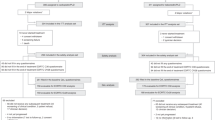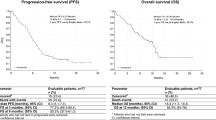Abstract
Purpose
To compare the efficacy, safety, and tolerability profiles of pegylated liposomal doxorubicin and carboplatin (PLDC) with those of gemcitabine and carboplatin (GC) for the treatment of patients with platinum-sensitive recurrent ovarian cancer.
Methods
Ovarian cancer patients with recurrence > 6 months after first-line platinum and taxane-based therapies were randomly assigned to PLDC [pegylated liposomal doxorubicin 30 mg/m2 plus carboplatin area under the curve (AUC) 5 mg/mL/min on day 1] every 4 weeks or GC (gemcitabine 1000 mg/m2 on days 1 and 8 plus carboplatin AUC 4 mg/mL/min on day 1) every 3 weeks for at least 6 cycles. The primary endpoint was progression-free survival, and overall response rate, overall survival, toxicity, and dose administration were secondary endpoints.
Results
One-hundred patients (49 PLDC; 51 GC) were randomly assigned. Over a median follow-up of 24 months, the median progression-free survival was 12.0 months (95% CI 9.2–15.0) for PLDC and 9.8 months (8.9–12.3) for GC [HR 0.69 (0.455–1.047)] with a difference of 2.2 months. The response rate was 57.1% (41.0–72.3) for PLDC and 56.4% (39.6–72.2) for GC. No obvious differences in toxicity (G3/4) were noted between arms. The median relative dose intensity of planned dose per week was 88.9% for pegylated liposomal doxorubicin and 53.1% for gemcitabine (p < 0.0001).
Conclusions
PLDC and GC are both good treatment candidates for platinum-sensitive recurrent ovarian cancer patients; however, the dose intensity was lower for GC than for PLDC. PLDC had a more favorable risk–benefit profile than that of GC for patients.

Similar content being viewed by others
References
Howlader N, Noone AM, Krapcho M, et al. SEER Cancer statistics review, 1975–2014, National Cancer Institute. Bethesda, MD, https://seer.cancer.gov/csr/1975_2014/. Based on November 2016 SEER data submission, posted to the SEER web site, April 2017
Center for cancer control and information services, National Cancer center, Japan https://ganjoho.jp/reg_stat/statistics/stat/summary.html. Accessed 22 May 2019
Jayson GC, Kohn EC, Kitchener HC et al (2014) Ovarian cancer. Lancet 384:1376–1388
Grunewald T, Ledermann JA (2017) Targeted therapies for ovarian cancer. Best Pract Res Clin Obstet Gynaecol 41:139–152
Aghajanian C, Goff B, Nycum LR et al (2015) Final overall survival and safety analysis of OCEANS, a phase 3 trial of chemotherapy with or without bevacizumab in patients with platinum-sensitive recurrent ovarian cancer. Gynecol Oncol 139:10–16
Ledermann J, Harter P, Gourley C et al (2014) Olaparib maintenance therapy in patients with platinum-sensitive relapsed serous ovarian cancer: a preplanned retrospective analysis of outcomes by BRCA status in a randomised phase 2 trial. Lancet Oncol 15:852–861
Hamanishi J, Mandai M, Konishi I (2016) Immune checkpoint inhibition in ovarian cancer. Int Immunol 28:339–348
Monk BJ, Minion LE, Coleman RL (2016) Anti-angiogenic agents in ovarian cancer: past, present, and future. Ann Oncol 27(Suppl 1):i33–i39
Tran G, Zafar SY (2018) Financial toxicity and implications for cancer care in the era of molecular and immune therapies. Ann Transl Med. https://doi.org/10.21037/atm.2018.03.28
Japan Society of Gynecologic Oncology guidelines 2015 for the treatment of ovarian cancer. https://jsgo.or.jp/guideline/ransou2015.html. Accessed 22 May 2019
Ovarian cancer including fallopian tube cancer and primary peritoneal cancer. NCCN clinical practice guidelines in oncology. Version 2.2018-March 9, 2018. https://www.nccn.org/professionals/physician_gls/pdf/ovarian.pdf. Accessed 22 May 2019
Parmar MK, Ledermann JA, Colombo N et al (2003) Paclitaxel plus platinum-based chemotherapy versus conventional platinum-based chemotherapy in women with relapsed ovarian cancer: the ICON4/AGO-OVAR-2.2 trial. Lancet 361:2099–2106
Pujade-Lauraine E, Wagner U, Aavall-Lundqvist E et al (2010) Pegylated liposomal doxorubicin and carboplatin compared with paclitaxel and carboplatin for patients with platinum-sensitive ovarian cancer in late relapse. J Clin Oncol 28:3323–3329
Pfisterer J, Plante M, Vergote I et al (2006) Gemcitabine plus carboplatin compared with carboplatin in patients with platinum-sensitive recurrent ovarian cancer: an intergroup trial of the AGO-OVAR, the NCIC CTG, and the EORTC GCG. J Clin Oncol 24:4699–4707
Holloway RW, Grendys EC, Lefebvre P et al (2010) Tolerability, efficacy, and safety of pegylated liposomal doxorubicin in combination with carboplatin versus gemcitabine-carboplatin for the treatment of platinum-sensitive recurrent ovarian cancer: a systematic review. Oncologist 15:1073–1082
Mandrekar SJ, Sargent DJ (2010) Randomized phase II trials: time for a new era in clinical trial design. J Thorac Oncol 5:932–934
Stallard N, Whitehead J, Todd S et al (2001) Stopping rules for phase II studies. Br J Clin Pharmacol 51:523–529
González-Martín AJ, Calvo E, Bover I, Rubio MJ, et al (2005) Randomized phase II trial of carboplatin versus paclitaxel and carboplatin in platinum-sensitive recurrent advanced ovarian carcinoma: a GEICO (Grupo Espanol de Investigacion en Cancer de Ovario) study. Ann Oncol 16:749–755
Ferrero JM, Weber B, Geay JF et al (2007) Second-line chemotherapy with pegylated liposomal doxorubicin and carboplatin is highly effective in patients with advanced ovarian cancer in late relapse: a GINECO phase II trial. Ann Oncol 18:263–268
Alberts DS, Liu PY, Wilczynski SP et al (2008) Randomized trial of pegylated liposomal doxorubicin (PLD) plus carboplatin versus carboplatin in platinum-sensitive (PS) patients with recurrent epithelial ovarian or peritoneal carcinoma after failure of initial platinum-based chemotherapy (Southwest Oncology Group Protocol S0200). Gynecol Oncol 108:90–94.
du Bois A, Pfisterer J, Burchardi N et al (2007) Combination therapy with pegylated liposomal doxorubicin and carboplatin in gynecologic malignancies: a prospective phase II study of the arbeitsgemeinschaft gynäekologische onkologie studiengruppe ovarialkarzinom (AGO–OVAR) and kommission uterus (AGO-K-Ut) Gynecol Oncol 107:518–525.
Power P, Stuart G, Oza A et al (2009) Efficacy of pegylated liposomal doxorubicin (PLD) plus carboplatin in ovarian cancer patients who recur within six to twelve months: a phase II study. Gynecol Oncol 114:410–414
Rapoport BL, Vorobiof DA, Slabber C et al (2009) Phase II study of pegylated liposomal doxorubicin and carboplatin in patients with platinum-sensitive and partially platinum-sensitive metastatic ovarian cancer. Int J Gynecol Cancer 19:1137–1141
Papadimitriou CA, Fountzilas G, Aravantinos G et al (2004) Second-line chemotherapy with gemcitabine and carboplatin in paclitaxel-pretreated, platinum-sensitive ovarian cancer patients. A hellenic cooperative oncology group study. Gynecol Oncol 92:152–159
Kose MF, Sufliarsky J, Beslija S et al (2005) A phase II study of gemcitabine plus carboplatin in platinum-sensitive, recurrent ovarian carcinoma. Gynecol Oncol 96:374–380
Sufliarsky J, Chovanec J, Svetlovska D et al (2009) Gemcitabine and carboplatin treatment in patients with relapsing ovarian cancer. Neoplasma 56:291–297
du Bois A, Lück HJ, Pfisterer J et al (2001) Second-line carboplatin and gemcitabine in platinum sensitive ovarian cancer—a dose-finding study by the Arbeitsgemeinschaft gynäkologische onkologie (AGO) ovarian cancer study group. Ann Oncol 12:1115–1120
J. Pfisterer, A.P. Dean, K. Baumann et al (2018) Carboplatin/pegylated liposomal Doxorubicin/Bevacizumab (CD-BEV) vs. Carboplatin/Gemcitabine/Bevacizumab (CG-BEV) in patients with recurrent ovarian cancer. Annals of Oncology 29 (suppl_8): viii332–viii358. https://doi.org/10.1093/annonc/mdy285.
Acknowledgements
We thank Izumi Kohara, Yoshie Ueki and staff of Global Clinical Research Coordinating Center of Kitasato University Hospital for general support of this trial, and Toshiharu Yamashita and Takaaki Takenaga for statistical support. We also gratefully acknowledge the participation of 100 women in this trial. This study was presented in part at the 20th Biennial meeting of the European Society of Gynaecological Oncology (ESGO2017), November 4–7, 2017, Vienna, Austria and the 17th biennial meeting of the international gynecologic cancer society (IGCS2018), September 14–16, 2018, Kyoto, Japan.
Funding
This study was supported by Janssen Pharmaceutical K.K. and the Japan Society of Clinical Oncology Clinical Research Program Grant. The study was performed and analyzed independently by the study groups (GOTIC and Intergroup in Japan).
Author information
Authors and Affiliations
Corresponding author
Ethics declarations
Conflict of interest
The authors declare no conflict of interest.
Medical institutions
Jichi Medical University, Kurume University School of Medicine, Saitama Medical University International Medical Center, Tottori University School of Medicine, National Defense Medical College Hospital, Osaka University Graduate School of Medicine, Kyushu University, Shizuoka Cancer Center Hospital, Yamagata University School of Medicine, Kansai Rosai Hospital, Iwate Medical University, Kosei Hospital, The Jikei University School of Medicine, Kashiwa Hospital, Hirosaki University School of Medicine & Hospital, Nara Medical University Hospital, Niigata University Medical and Dental Hospital, Mie University Hospital, Ehime University Hospital, Hyogo Medical College Hospital, Miyoshi Central Hospital, Nagaoka Red Cross Hospital, NHO Shikoku Cancer Center, Niigata Cancer Center Hospital, Tottori Municipal Hospital.
Additional information
Publisher's Note
Springer Nature remains neutral with regard to jurisdictional claims in published maps and institutional affiliations.
About this article
Cite this article
Fujiwara, H., Ushijima, K., Nagao, S. et al. A phase II randomized controlled study of pegylated liposomal doxorubicin and carboplatin vs. gemcitabine and carboplatin for platinum-sensitive recurrent ovarian cancer (GOTIC003/intergroup study). Int J Clin Oncol 24, 1284–1291 (2019). https://doi.org/10.1007/s10147-019-01471-5
Received:
Accepted:
Published:
Issue Date:
DOI: https://doi.org/10.1007/s10147-019-01471-5




